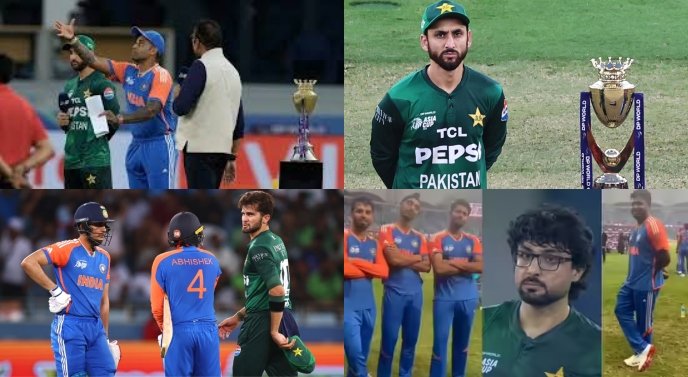The Asia Cup has always been more than just cricket; it is a stage where rivalries, emotions, and national pride collide. But the Asia Cup 2025, originally scheduled to be hosted in India and later shifted to the UAE due to political concerns, went beyond cricketing battles. What should have been a celebration of sport, turned into a political spectacle, where handshakes, celebrations, and even trophies were caught in the crossfire.
The Handshake Drama – Where Asia Cup 2025 Political Drama Began
The signs of tension emerged before a single ball was bowled. During the captains’ meet, every leader shook hands, except the skippers of India and Pakistan. Salman Ali Agha eventually extended a quick handshake to Suryakumar Yadav, but the stiffness was impossible to miss. The drama intensified when ACC President Mohsin Naqvi exchanged smiles with SKY, which was bashed on social media, with fans accusing him of “softness” toward India.
Boycott Asia Cup Trends & Pahalgam Tensions
Matters escalated further with the tragic Pahalgam incident, which Indian voices baselessly pinned on Pakistan. Soon after, “Boycott Asia Cup” trended heavily across Indian platforms. Analysts and former players declared that India should never face Pakistan again. For a while, even the tournament itself looked uncertain, with speculation that matches involving Pakistan could be scrapped.
Group Stage & Super 4 Matches – No Handshakes Again
Despite the tension, the group stage match on 14 September went ahead. The toss was cold; no handshake. The post-match moment was colder, with neither captain making the customary gesture. Heated banters and gestures were exchanged on the field, setting the tone.
The Super 4 clash on 21 September carried the same frost. Later, it was revealed that umpire Andy Pycroft was summoned by the PCB after it was discovered he had told both captains not to shake hands, an instruction he admitted came directly from the BCCI. Even after the apology, no handshakes followed.
On-Field Celebrations Turned Political
As tensions ran high, player celebrations became flashpoints. Haris Rauf’s jet-down action on September 21 reminded many of Pakistan’s military symbolism, sparking outrage in India. Sahibzada Farhan’s gunfire gesture on reaching his fifty added fuel to the fire. Both were fined, Haris docked 30% of his match fee, but Pakistani fans argued that Indian provocation had started it all. Naqvi reportedly announced that he will personally pay Rauf’s fine.
Suryakumar Yadav’s War Dedication & ICC Sanctions
If Pakistan’s celebrations were controversial, India’s post-match statements were not far behind. Suryakumar Yadav dedicated the victory to the Pahalgam war victims, politicizing the result. The ICC responded with a fine, but the damage was done. Cricket had officially become a canvas for war rhetoric. Even after the final match, Suryakumar took it to his X account and dedicated victory to the war victims.
The Final – Trophy Boycott & Political Messaging
The grand finale on 28 September in Dubai was expected to restore cricket’s glory, but instead, it sank deeper into politics. India clinched the title, winning all three matches against Pakistan. But the drama unfolded during the presentation.
The Indian players refused to receive the trophy from ACC President Mohsin Naqvi, choosing instead to pose without it. They mocked Pakistan’s celebrations on social media, with players like Arshdeep Singh mimicking Pakistani cricketers. Salman did not step back either. In a post-match conference, he bluntly mentioned ‘dedicating match fees to children and people who lost their lives during the Indian attack.’
Then came the political cherry on top: Prime Minister Modi’s tweet, comparing Pakistan’s cricket loss to military defeat in “Operation Sindoor.” Naqvi’s sharp reply went viral:
“If war was your measure of pride, history already records your humiliating defeats at Pakistan’s hands. No cricket match can rewrite that truth. Dragging war into sport only exposes desperation and disgraces the very spirit of the game.”
Conclusion – Cricket Lost, Politics Won
What unfolded at the Asia Cup 2025 was a tragic reminder of how politics can poison the spirit of sport. From handshake snubs and on-field gestures to trophy boycotts and fiery political statements, cricket took a backseat.
Instead of celebrating talent and passion, the tournament became a political battlefield where every smile, every gesture, and every celebration was dissected through nationalist lenses. For fans across Asia, the disappointment was profound, because while India won the tournament, it was clear that the real loser was cricket itself.

